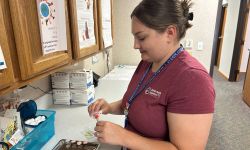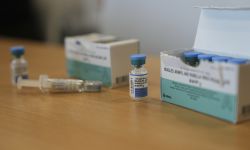Detroit off to slow start restoring water to homes as coronavirus hits

Technology issues and a lack of contractors have slowed Detroit’s efforts to safeguard against coronavirus by restoring water to residents whose taps were shut off for nonpayment.
Gary Brown, director of the city’s Water and Sewerage Department, told reporters on Friday that so far the city has reconnected water to 73 of an estimated 2,800 occupied homes that are without service.
Waits of an hour or more to a help telephone line have been common, and the city hasn’t had enough plumbers under contract to make repairs to pipes damaged by long shutoffs, Brown said.
Before Friday afternoon’s press conference, Brown said he called the help line, 313-386-9727, and was 37th in the queue. More operators and lines are being installed, and three more plumbing conractors should be on board early next week.
“By next week, you will see those [shutoff] numbers come down fairly quickly,” Brown said.
- The latest: Coronavirus Tracker: What Michigan needs to know, with map of known cases
- How to prepare for coronavirus in Michigan. Step 1: Breathe
- How to make your own hand sanitizer during coronavirus shortage
- Can I get tested for coronavirus in Michigan and other questions answered
The update was for a city plan that began Wednesday to allow residents to avoid shutoffs — or get service restored — if they pay $25 and $25 per month toward their debt. (Normal rate requirements for water restoration are at least 10 percent of a resident’s delinquency.)
As Michigan and the nation respond to the spread of the new coronavirus, and the importance of hand washing with soap becomes paramount, the program was announced as an effort to halt the spread of the virus. For 30 days, the state of Michigan will pay the $25 downpayment for those who can’t afford it.
Cities including Toledo, New Orleans and Atlanta have halted shutoffs during the coronavirus. Detroit officials halt disconnections in winter, don’t typically resume them until April and say their priority now is to restore service.
Detroit’s response is far too slow for water activists such as Sylvia Orduño of the Michigan Welfare Rights Coalition, a group that along with other social agencies petitioned Gov. Gretchen Whitmer to declare the shutoffs a public health emergency.
“This is a crisis. We can’t wait weeks for water to be restored,” Orduño told Bridge.
“They don’t have the capacity to deal with this. The pace is too slow for an emergency situation and there are many households still in a vulnerable state.”
Her group may soon call on Whitmer or others to establish emergency stations to distribute water similar to ones during the Flint water crisis. Additionally, activists want a more rigorous effort to locate families without water, rather than relying on them to call the city for help.
Restorations typically take 20 minutes, but the pace was slowed last week because so many homes without water over the winter required extensive repairs or meter installations, Brown said.
"The process to turn on water service is not as simple as turning a key," he said.
The situation comes six years after Detroit began an aggressive effort to increase collections for its aging system by disconnecting accounts that were 60 days or $150 past due.
Last year, the city disconnected more than 23,000 homes, of which 9,500 were still off as of Jan. 15, city records show.
Subsequent investigation by city officials has found that many of those houses were vacant or occupied by squatters, city officials said, leaving about 3,000 customers without water, Brown said.
By Sunday, a city contractor, Human Fliers of Detroit, should complete a door-knocking campaign to all the houses in an effort to get occupants to sign up for water restoration, Brown said. The group has a $75,000 contract with the city.
City records show that, since Wednesday, 3,000 customers have called for help and of those more than 570 were without water.
Brown said the city is determined to help those without water, but added that he has no illusions all will receive it.
“Right now it’s all hands on deck to turn water back on so people can wash their hands,” Brown said.
“[But] we have people who are proud. They don’t want to ask for help.”
See what new members are saying about why they donated to Bridge Michigan:
- “In order for this information to be accurate and unbiased it must be underwritten by its readers, not by special interests.” - Larry S.
- “Not many other media sources report on the topics Bridge does.” - Susan B.
- “Your journalism is outstanding and rare these days.” - Mark S.
If you want to ensure the future of nonpartisan, nonprofit Michigan journalism, please become a member today. You, too, will be asked why you donated and maybe we'll feature your quote next time!








